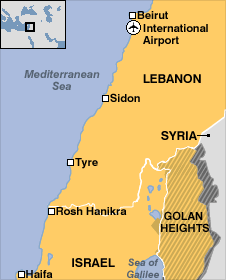Israel has long complained about Syrian President Bashar al-Assad’s alliance with Iran, his support for the Shiite militia Hezbollah and his sheltering of leaders from Palestinian militant groups, such as Hamas, in Damascus.
 But with Assad facing the most serious threat to his rule since he took power nearly 11 years ago, Israelis have been forced to confront the notion that they may well be better off with him than without him.
But with Assad facing the most serious threat to his rule since he took power nearly 11 years ago, Israelis have been forced to confront the notion that they may well be better off with him than without him.
Assad, like his father before him, has ensured that the Israeli-Syrian border has remained Israel’s quietest front for decades, enabling that country’s northern residents to flourish in an atmosphere of relative peace even as the two nations remain technically in a state of war.
The possibility that the fundamentalist Muslim Brotherhood or radical groups could rise to power in place of Syria’s secular, stable leadership has prompted fear among some Israelis. Watching the Muslim Brotherhood gain a foothold in Egypt’s political system after the ouster of President Hosni Mubarak has only fed an Israeli squeamishness about the prospect of regime change in Damascus.
As one member of Israeli Prime Minister Binyamin Netanyahu’s cabinet put it, “We know Assad. We knew his father. Of course, we’d love to have a democratic Syria as our neighbor. But do I think that’s going to happen? No.”
For now, there is little that Israel can do other than sit and monitor the demonstrations in Syria, which have drawn thousands to the streets over the past 10 days and led to clashes with security services, leaving at least 60 people dead. On Tuesday, the Syrian cabinet resigned in an effort to prop up Assad, who is expected to lift a repressive emergency law and ease other restrictions.
“We’ve had a dictator, but it’s been very quiet,” a senior Israeli military commander said.“On the other hand, it’s absolutely clear to us that the Syrians play a negative role” in the region.
The possibility that the fundamentalist Muslim Brotherhood or radical groups could rise to power in place of Syria’s secular, stable leadership has prompted fear among some Israelis. Watching the Muslim Brotherhood gain a foothold in Egypt’s political system after the ouster of President Hosni Mubarak has only fed an Israeli squeamishness about the prospect of regime change in Damascus.
As one member of Israeli Prime Minister Binyamin Netanyahu’s cabinet put it, “We know Assad. We knew his father. Of course, we’d love to have a democratic Syria as our neighbor. But do I think that’s going to happen? No.”
For now, there is little that Israel can do other than sit and monitor the demonstrations in Syria, which have drawn thousands to the streets over the past 10 days and led to clashes with security services, leaving at least 60 people dead. On Tuesday, the Syrian cabinet resigned in an effort to prop up Assad, who is expected to lift a repressive emergency law and ease other restrictions.
“We’ve had a dictator, but it’s been very quiet,” a senior Israeli military commander said.“On the other hand, it’s absolutely clear to us that the Syrians play a negative role” in the region. WP

Leave a Reply
You must be logged in to post a comment.